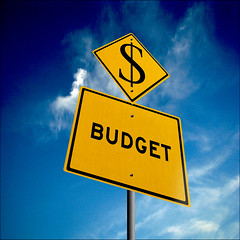 |
| budget (Photo credit: 401(K) 2012) |
a) Planning- To achieve its goal, an enterprise must plan what it must do and how it will reach the goal. In the processes of assessing the factors that will help reaching the goals, the enterprise should also anticipate problems that would make the process of reaching its goals difficult. Having identified some of these problems, it can decide well in advance how it would overcome them, if and when they came up.
b) Coordination- This involves proper balancing of all factors and coordinating the efforts put together by various departments and persons to reach the goals of the enterprise. If they do not work in synchronized manner, the organization will never be able to reach its goals.
c) Control- It is a process of keeping watch over actions and taking immediate planned action at the first signs of deviation from the planned course of action. In this way, events are compelled or directed to confirm the plans.
Types of Budgets-
Generally a master budget is prepared which in turn, is broken in to functional budgets. Budgets may be classified as follows-
i) Basic Budget & Current Budget.
ii) Fixed budget a& Flexible budget.
iii) Master budget & Functional Budget.
Basic Budget-
Basic Budget is based on a long term plan and is used on a long term plan and is used as a basis for developing current budget. A basic budget is much broader in scope and less detailed than a current budget. It may be fixed or flexible. The basic data are not updated whenever there are change in conditions such as increase in material price or wage rates. As a result, the use of basic budgets gives rise to operating variances. That is why for control purposes current budgets are more useful.
Current Budget- It is established for use over a short period of times usually one year but sometimes even less and related to current conditions that is average conditions which are likely to prevail during the budget period.
Fixed Budget- A fixed budget is designed to remain unchanged irrespective of the volume of output or turnover attained. The budget remains fixed over a given period and does not change with the change in the volume of production or level of activity attained . Normally, such a budget is prepared in respect of expenses of a fixed nature. As such this budget is of limited application.
Flexible Budget- A flexible budget by recognizing the difference in behaviour between fixed and variable costs in relation to fluctuation in output or turnover is designed to change appropriately with such fluctuations. A flexible budget changes according o the level of activity.
It is the results of two factors, a) the passage of time and b) the productive activity. The concept of cost variability gives rise to three categories of costs such as –
i) Fixed cost
ii) Variable cost
iii) Semivariable cost
Fixed cost does not vary with the volume or production activity but accrue with the passage of time. They are time or period cost. They remain constant over a period of time irrespective of the volume or level of activity. Variable cost vary in proportion to the volume of activity. They accrue as a result of efforts, activity or work done. They are product cost. They would not arise if there are no activity. Semi variable costs contain elements of both fixed and variable costs.
Master Budget- A Master Budget is prepared from and summaries, the various functional budgets. It is also called summary budget. It is a summary plan of the overall activities of the enterprise for a definite period. It generally includes details relating to production , sales, stocks, debtors, cash position, fixed assets etc, in addition to important control ratios.
The Master Budget embraces both operating decisions and financial decisions. When all budgets are ready they can finally produce budgeted profit & Loss A/C or incomes statement and budgeted balance sheet. Such results can be projected monthly, quarterly, half yearly and year end. When the budgeted profit falls short of the target it may be reviewed and all budgets may be reworked to reach the target or to achieve a revised target approved by the budget committee.
Functional Budget- It is a budget of income or expenditures appropriate to or the responsibilities of a function such as production, sales, purchase etc. Each functional department prepares its own budget and all these functional budgets are then integrated in to the master budget. The following functional budgets are generally prepared.
Budget Prepared by
Sale- Quantity & Value Sales Manager
Selling & Distribution Cost Sales MANAGER
Production- Units & plant Production manager
Utilization Personal Personnel Manager
Materials Purchase Manager
Factory Expenses Production Manager
Administrative Expenses Finance Manager
Cash Finance Manager
Capital Expenditure Chief Executive
Research & Development R & D manager










0 comments:
Post a Comment